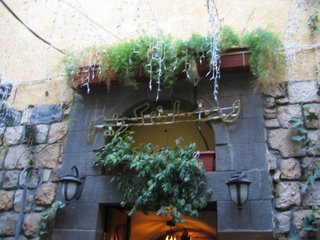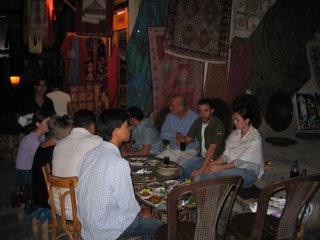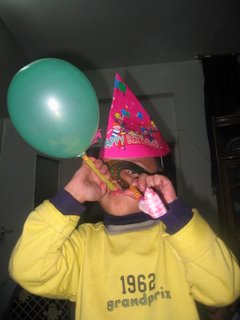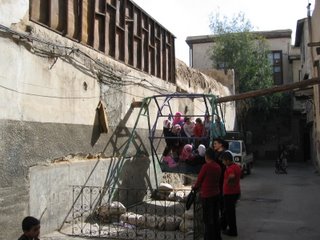Ladies' Night In Saydnayya
 As you walk through the souq, you might notice that nearly all the shops are run by men. Warda is one of the few women working on the main street, in an artist’s shop. She is a nurse by trade in her early 50s, but is helping to cover her daughter’s shifts at the shop while she finishes her university exams. She invited me to go to Saydnayya with a group of ladies on Friday. I haven’t had a chance to visit the famous church of Our Lady of Saydnayya yet, so I decided to go.
As you walk through the souq, you might notice that nearly all the shops are run by men. Warda is one of the few women working on the main street, in an artist’s shop. She is a nurse by trade in her early 50s, but is helping to cover her daughter’s shifts at the shop while she finishes her university exams. She invited me to go to Saydnayya with a group of ladies on Friday. I haven’t had a chance to visit the famous church of Our Lady of Saydnayya yet, so I decided to go.I went to Bab Touma around 2pm to meet Warda and saw her friend Nadia, also in her 50s, who I had met the week before. Nadia was joining us on the trip too. The first thing she asked me was why I hadn’t visited her yet. I just met her a week ago! But this is common in the Arab world; evenings are reserved for social and family visits, and maintaining these ties are essential for help, support, and to keep from being alone.

Nadia and I waited together for Warda to come pick us up. Finally we saw her waving to us from across the square. She led us to one of these colorful tricked-out school minibuses that are all over Damascus. The bus was filled with women in their 40s and 50s, along with their daughters and grandkids, and one of them had gotten her daughter’s school to loan us the bus and driver for the day.
Warda told me that these women were all in a group together in her neighborhood, Jaramana. They meet every week and collect a little money, so that around Christmas, they can distribute it out. Warda says “We may not have much on our own, but when we put it together, it becomes a lot!” I asked what they used the money for. “If someone needs help, or if they need to buy something, like move into a new house, or a car, or their child’s education, then they get the money.” The other women were bothering Warda for her 50 lira since she missed the meeting last week covering her daughter’s shifts at the artist’s shop.
With the exception of Warda, all of the women work in the home. As a nurse, she no longer has a regular hospital or clinic job but makes house calls in the neighborhood if people need medical care, administers medications and injections, and also assists a local plastic surgeon if she has any surgeries scheduled, like breast implants or nose jobs. “But these women aren’t the ones that tell you it is shameful to work, right?” (Warda has complained to me before about people gossiping about her for working outside the home). “Oh no, they don’t have a problem with it.” “And we all have good husbands. They let us go out and go to restaurants and they are OK.” I responded, “Well, you are all women, so it’s not a big deal.” “Yeah, we are all women so there is no problem. We just want to go out and enjoy ourselves.”
 Warda is Muslim, but all of the other women in the group are Christian. But since she doesn’t wear hijab or an Islamic pendant around her neck or any other marker of religious identity, you really can’t tell the difference between her and her friends. She was wearing some knee-high wedge boots with a skirt, so that her knees showed in between, with a white tank blouse and a grey sport jacket. She had light makeup on, some pink lipliner with sparkly magenta lipgloss, and mascara. The other ladies were also all decked out in their Friday best.
Warda is Muslim, but all of the other women in the group are Christian. But since she doesn’t wear hijab or an Islamic pendant around her neck or any other marker of religious identity, you really can’t tell the difference between her and her friends. She was wearing some knee-high wedge boots with a skirt, so that her knees showed in between, with a white tank blouse and a grey sport jacket. She had light makeup on, some pink lipliner with sparkly magenta lipgloss, and mascara. The other ladies were also all decked out in their Friday best.One woman was wearing a tan knit shirt with a cutout below the breasts. There was a strip of fabric that hung across the shirt underneath her breasts from the side seams, and it held her breasts up so that they were busting halfway up her chest above the sparkles on the sweetheart neckline of her shirt. She had on tight black pants and black pantyhose underneath which you could see over her waistline when she bent over, and wore dark red lipstick with her jet black hair. Her daughter, who is still finishing school and unmarried, was wearing a tight cheetah-print top with cutouts on the shoulders, tight black pants with vinyl leather trim, and spike-heeled cheetah print boots. She was beautiful, and highlighted her beauty with black eyeliner around her eyes.

Another mother, Sahar, who Warda calls the group “president,” was wearing a sheer black mesh shirt with sequins on the v-neckline, paired with tight jeans and spike-heeled boots. She wore tan lipliner with a mauve gloss, foundation, and mascara. Her black hair was coiffed and curled. Her daughter, who was gorgeous, also wore cheetah print and had long brown wavy hair which she styled with gel. She wore a tiny butterfly clip to hold up a small plait of hair over her face. She needlessly wore a full face of makeup over her unblemished skin, with foundation, blush, eyeshadow and eyeliner, lipliner and lipstick. She carried her toddler son with her, who was about 2 years old.
Ayla was the vibrant, loquacious Lebanese woman who talked the whole ride up. She married a Syrian man and they live in Jaramana. She wasn’t as put together or attractive as the other ladies, but she was spunky. She had dyed reddish-brown hair cut to her shoulders, and it looked like it had been curled a day or two before. She wore a black knit shirt with tight black pants and spike-heeled boots, and you could see her black nylons peeking out of the top of her pants also. She didn’t wear makeup and had rectangular eyeglasses, and brought her two schoolage children with her, about 9 and 11 years old, a girl and boy.
Finally, Warda had invited Amal, her friend of 30 years, to come along, who was visiting. She and her husband split their time between Syria and Quebec.
Warda mentioned to Ayla that I had wanted to go to the church of Our Lady of Saydnayya but she just laughed and belted out “We’re not going to church, I want to drink!” gesturing the motion with a hand to her mouth while tilting her head back.
We arrived in Saydnayya and passed in front of the restaurant off the main road. The ladies had never been to this restaurant before, and there was some disagreement about whether it was worth it. Through the façade of windows we could see that the hall was nearly empty, with only a couple other families sitting and eating. But Ayla insisted that there was people (or at least there would be), and that it would be great. We waited inside the bus as she went inside to speak with the host. Warda and the other ladies, meanwhile, were saying that they didn’t want to sit in a restaurant with nobody in it, that there were other places with better atmosphere and decor. Apparently this was a day to sit and be seen and party it up a little bit, which can’t be done in a quiet empty restaurant.
But Ayla called us all in from the entrance and we followed. After we entered the restaurant apparently reached its critical mass and they switched on some loud Arabic pop music, which blared at us from the speaker situated next to our table. We got a full set of mezze, with the usual baba ganoush, hummus, muhammara, fries, and fattoush, and some other things I don’t see as often, like jarjeer salad, raw meat, and shankleesh.
 Immediately, the women started drinking araq (an anise-flavored liquor), while a young female Lebanese singer came on to entertain us. Then a big Syrian man with greasy hair came on and did a set, and then they did a back-and-forth question and answer together. It was cool, kind of like rappers battling except in Arabic song form. These were followed by two young, attractive Syrian male singers. The requisite nationalist expressions were covered by all four singers that came on. “Syria al-Asad!”
Immediately, the women started drinking araq (an anise-flavored liquor), while a young female Lebanese singer came on to entertain us. Then a big Syrian man with greasy hair came on and did a set, and then they did a back-and-forth question and answer together. It was cool, kind of like rappers battling except in Arabic song form. These were followed by two young, attractive Syrian male singers. The requisite nationalist expressions were covered by all four singers that came on. “Syria al-Asad!” 
After the women had finished a few drinks, the beautiful 20-something in our group got up and did an Arabic dance for our table. The entire restaurant had their eyes on her, even though she was directing her attentions only to our table. But she was very sexy, moving her behind around in big circles and swaying her pelvis, with her hands delicately raised to her head. Her body was soft and you could see everything moving through her tight cheetah shirt, from her breasts to her belly and her back.

A big Muslim family, meanwhile, had walked in and took a table a few away from ours. They weren’t too excited about her dance. Nor was the Muslim double-date across from us, who I noticed because they had a big bottle of J & B whiskey on their table. But when the women got up the next time to do a dabka (Arab folk dance), the Muslim family was quite encouraging when they saw our young mother’s toddler try to follow along on the line. They clapped along and smiled at him in his feeble attempts to move his feet. The beautiful young unmarried woman led the line, and you could see everything jiggling when she started to jump and stomp.
As the night went on and the araq kept flowing, the ladies got more and more wild. Their conversation was dotted with cuss words and joking name-calling. “Sharmoota!” (whore!), “Bukhshi!” (my asshole!), “Kul khara!” (eat shit!), “Himaara!” (donkey/ass!), “Haqeera!” (vile, wretched!) were the most frequently utilized words as they traded banter back and forth across the table.

Not much later, the same situation recurred, only Sahar was drunk at this point, and decided that she would throw her glass of araq at Warda and her phone. But her aim was quite wide of the mark, and instead of aiming across the table past me at Warda, she hit Amal in the face who was sitting two seats down from her. Remember, this is hard alcohol. At first Sahar didn’t seem to realize what had happened or where the araq had disappeared to, since Amal immediately reacted and turned away and held her hands to her eyes. I offered her some tissues and Warda dipped them in water to flush out her eyes.
When Sahar turned her head again and looked back in our direction she saw what had happened, and that Amal’s face, hair, and shirt were all wet and her eyes were red and burning. She tapped Amal’s shoulder from behind Nadia and put her hands together, pleading forgiveness. “I’m so sorry, really, I meant to hit Warda!” I thought it was a curious apology, saying that she was aiming at someone else, since it seemed to indicate that Sahar didn’t see anything wrong at all with throwing araq, as long as it hit the person you were aiming for. But Amal just turned away and kept drying her eyes and face and hair and clothing. Sahar consoled herself for her bad behavior by pleading innocence with the others and hugging Nadia tightly (who was sitting in between them) and telling her how much she loved her and how well they got along.
So for the next 30 minutes we had to watch Sahar pleading with Amal to forgive her, until finally she decided that she had apologized enough so that when Warda mentioned that Amal was going back to Canada in April, Sahar just said “Good. Let her go.” But the others were more polite, saying “Let us know before you leave, and we will all get together and go out.”
Religion wasn’t much a topic of conversation, but it did come up a few times. After his set toward the end of the night, one of the singers came over and sat with us. The first question was “Where are you from?” “Suwayda” (which is generally taken to mean that you are Druze). This led to a small bit about religious pluralism “You know, we don’t have any problem with anyone. Look at us. She is Muslim and we are all Christians, and we are great friends!” There were several other times during the night where it seemed like Warda was a badge of pride for the other women, as their Muslim friend.
But Warda is an interesting case. Sometimes, it seems to me that she is a self-hating Muslim. She worked in Libya during the 90s, and when she returned to Syria, she said everyone was wearing hijab. She didn’t understand what had happened. And she has told me that she has been to church more than mosque in her life. She says she likes church, because her friends go. And during dinner, there were several times when Warda seemed to be asserting her connection and solidarity with her friends by shouting out “I love Jesus Christ!” (بحب السيد عيسى المسيح!), as they drank more and more araq.
I wanted to ask her if she also loved Muhammad, but I didn’t want to damage her by putting her on the spot in front of all her friends. At the same time, she has never stopped claiming her Muslim identity, and she has asked me to take her to one of the mosques I have been working in my research. Is she looking for a way to reconnect with Islam? But if I arrange for her to meet with the sheikh, I don’t want it to appear like a religious intervention, since he will want to know why he should meet with this “ordinary” Syrian and I will inevitably end up informing him that she has mostly lost touch with the Muslim community.
As the night ended the women, most of whom were drunk, commenced planning how to steal the ashtrays and silverware from the restaurant. In Syria, where a majority of the population smokes, waiters come around and replace ashtrays with clean ones as often as waiters in the US come around with water. “Waiter, I thought you just gave us two ashtrays?! Where did they go?!” “I don’t know, maam, I did just give you two ashtrays.” “I really don’t know where they went, can you please get us some more?” This game went on for a couple rounds as they slipped the ashtrays into their purses. The waiter played along and seemed to find it funny in a ridiculous and annoying way. Sahar also made off with a steak knife, which Nadia got irritated over when she didn’t see it at her place setting anymore and she wanted to cut an apple from the after-dinner complimentary fruit tray, which we had obtained by badgering the waiters that “Every decent restaurant gives complimentary fruit after dinner. If you don’t give us some fruit we are never coming back!”
Perhaps the funniest thing about the whole night was that Sahar and a couple of the others are fasting for Lent, the fast period before Easter. So they were eating only salads and vegetables, no meat or dairy or animal products. Yet somehow the drinking and cussing and stealing just didn’t seem to be in the spirit of continence that the priest might tell us fasting is supposed to obtain.

.jpg)
.JPG)
.jpg)
.JPG)
.JPG)
.JPG)




